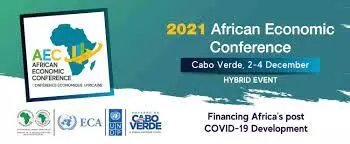- Home
- /
- Business/Economy
- /
- Debt renegotiation,...
Debt renegotiation, vaccine equity in focus as Africa Economic Conference commences

Participants of the Africa Economic Conference which opens in Cape Verde on Thursday have called for the renegotiation and even outright pardon of debts owed by African countries. According to the participants, the call is coming in view of the need to help the African continent recover from the devastating effects of the Coronavirus (COVID-19). Participants who cut across the United Nations (UN), African Development Bank (AfDB), and heads of governments, also brought to the front burner the need for vaccine equity and alternative sources of financing. They also said curbing illicit financial flows would go a long way towards the solutions to the economic problems bedevilling African economies. The conference, which has as its theme: 'Financing the Development of Africa Post-COVID-19', is the 17th edition in the series and is co-sponsored by the United Nations Development Programme (UNDP) and the AfDB.
Declaring the 3-day conference open, President of Cape Verde José Maria Neves, stressed the need for vaccines to be more accessible pointing out that Africa should be able to produce its own vaccines. He said that Africa had been negatively affected by the multiple consequences of the pandemic in all fields of human endeavour. Neves said that the pandemic only worsened the already existing challenges in Africa. Neves who said that the solutions should transcend the immediate challenges, called for an end to illicit financial flows. African countries must guarantee that the efforts made must go beyond the immediate challenges – poverty, social inequality, lack of portable water, shelter and sanitation, and food insecurity.
Neves said Africa cannot by itself have enough means to finance the measures of recovery from those economic crisis caused by the pandemic, there is a need to ensure complementary financing through other sources. These sources include external or foreign investments, international cooperations, foreign financial aid, and renegotiation of debts. They understand that the moment of moratorium needs to be extended. He said there is a need for renegotiation of the debts and in several cases the partial pardon on the part of the lenders in exchange for strong commitments to making sustainable investments in social programmes, capacity building, education, and health as well as infrastructure development. The Cape Verdean leader pointed out that in spite of the attendant shocks, the pandemic had presented an opportunity for change in Africa.
On her part, the United Nations Deputy Secretary General, Amina Mohammed said that the challenges confronting Africa could not be tackled by Africa alone. She called on the western world to help finance Africa's development and free it from the burden of indebtedness. She said Africa could have more than enough to tackle its challenges if it was not losing 90 billion dollars to illicit financial flows and corruption. Before the pandemic, Africa enjoyed sustained economic growth for more than a decade, but Africa cannot recover from COVID-19 alone. They need global solidarity, demonstrated through deep debt relief and increased concessional finance. African countries themselves must maximise resource mobilisation to enable investments in social protection, infrastructure, and technology. She said they must also end the illegal outflow of almost 90 billion dollars annually through badly sourced contracts and corruption. They need concerted efforts to reduce borrowing costs for African countries and to engage with non-traditional sources of development finance including the private sector.
On his part, the UNDP administrator, Achim Steiner urged African countries to make smarter and bolder choices on how to recover well from COVID-19. They must ensure vaccine equity which is the fastest way to end this pandemic. Secondly, they are seeing worrying signs of an uneven global economic recovery. Countries across Africa need new access to finance and debt relief measures – as well as innovative financing solutions. Thirdly, countries in Africa need more tailored support to transition to a green economy, and lastly, Africa has the potential to leverage digital technology to address acute development challenges.
Delivering an address of welcome, Dr Rui Soares, Minister of Foreign Affairs of Cape Verde, expressed the hope that the proposal from the conference will translate to concrete action to mitigate the economic crisis. According to him, Africa is among the most vulnerable and deserves special attention in terms of supporting its development through financing so that it is not left behind. He said there is urgent obligation to protect citizens especially in the face of the new variant. The foreign minister also spoke of the need for debt burdens to be lightened for many African countries, pointing out that the debts should be renegotiated. Everyone is aware of the effects of the pandemic with public expenditures increasing vis-a-vis public debts. He added it is necessary to negotiate the debts.



